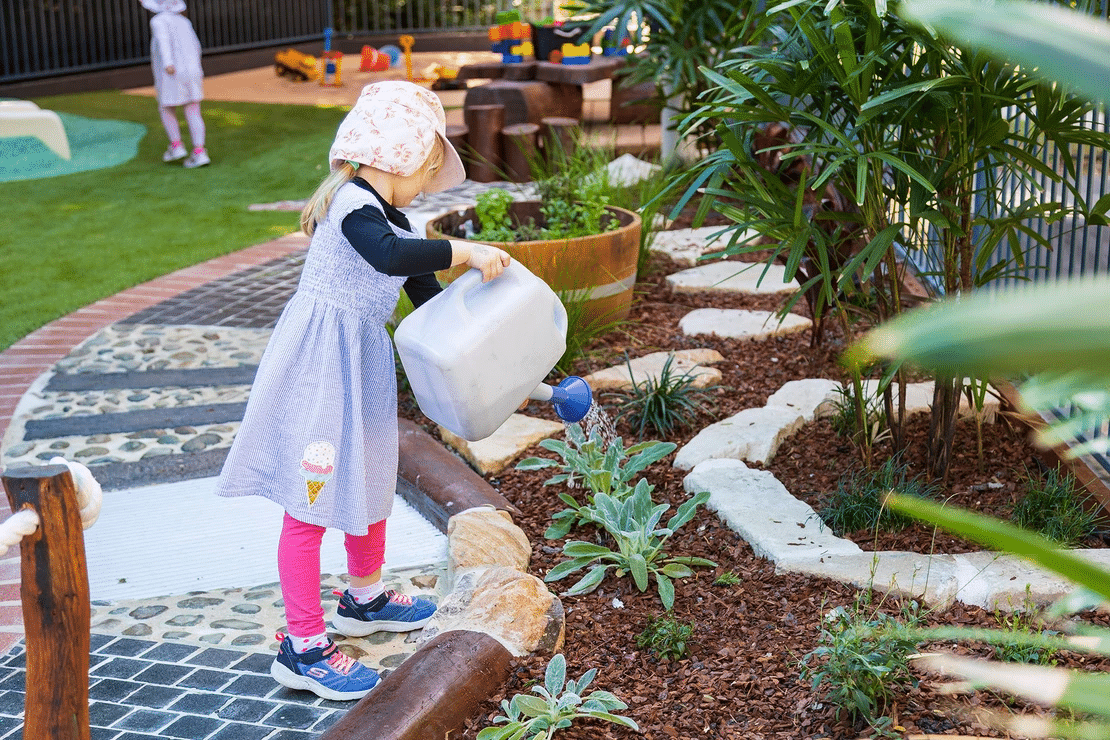 Book a Tour
Book a Tour Instagram
Instagram Contact Us
Contact Us CCS Estimator
CCS Estimator
Your child learns and grows in a variety of different ways. They learn how to talk by listening to and watching people speak. They learn how to walk by watching others and trying themselves (with lots of tumbles in the process!). And they learn how to be emotional beings by spending time around all types of personalities.
But there’s also a critical need for your child to develop in the great outdoors – more so today than ever before. After all, kids today only spend an average of 1.2 hours outside playing every day. At Heritage House, we love spending time with your children outdoors, and here’s why it’s such a great way to feed their minds.


While it’s true that playing outside has immediate benefits for your child’s physical development, it also contributes to their social, emotional and intellectual development. Here are five of the biggest pros:
At Heritage House, we love encouraging the children to play in lots of different ways outside. It’s not just about running around with your friends until you’re exhausted – although that’s definitely a lot of fun, too!
‘Tricky play’ is when children are being challenged both physically and mentally while playing. It could be a fort they have to think about before climbing over, or a tunnel they have to crawl through. It could be a sandpit where they have to think up what they want to create, or collecting lots of sticks to build a fort, needless to say, there is a lot of mental negotiation, lateral thinking and hypothesising that happens along the way!
Imaginative & Pretend Play, is where children role-play and act out various experiences they may have had or something that is of some interest to them. They experiment with decision making on how to behave and also practise their social skills and language development.
Water play is also a great experience for little ones. Not only is it lots of fun to play with, but water can teach them about the basics of maths and science – measurements like volumes and quantities are passively learnt as they fill up cups and bottles. Similarly, playing with ice and blowing bubbles can help with their sensory development.
Constructive Play is when children like to build and create things big and small. At Heritage House we incorporate this into our Outdoor program with the addition of blocks, giant polydron gears, manipulative links, diggers in the sandpit and so much more. Our Heritage House playground is perfect for discovering patterns, developing an awareness of shape and texture and problem solving.
We all develop differently, but especially children as they progress through the early years of their life. So you can’t expect a two-year-old to have the same outdoor-play experience as a five-year-old, for example.
No matter how young they are, children need the opportunity to play outside. Before they can walk they may not be able to do much more than sit and grab things that are within reach, but this can be hugely beneficial to their development. Older children, on the other hand, need the freedom to run around and play with their friends, helping them develop their social and physical skills in an environment that lets them be completely themselves.
Additionally, some children blossom through solitary play, which is exactly what it sounds like – doing things by themselves. Our playground is composed of different elements to facilitate solitary play, such as herb gardens, corners for drawing, reading nooks and more!
At Heritage House, we understand that children need different stimulus for outdoor play depending on their age, their development and how they like to play – which is why outside time at our centres is so much fun!


Want to know more about how Heritage House encourages childhood development through outdoor play? Contact your local Heritage House centre or reach out to us online.